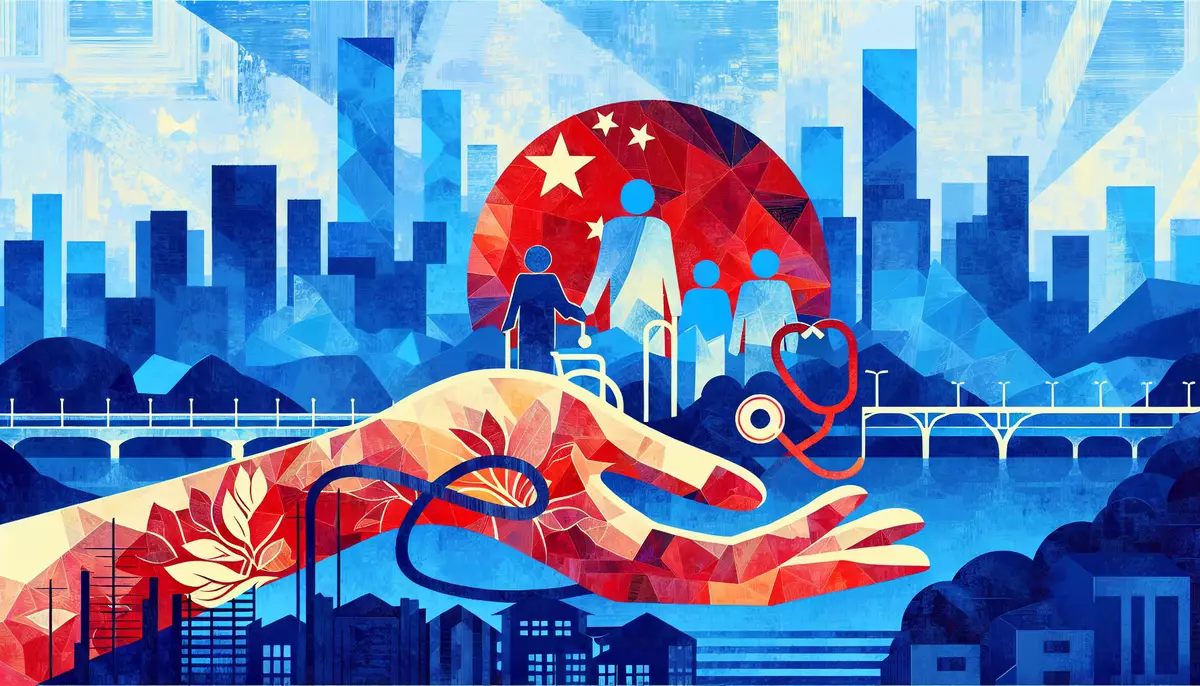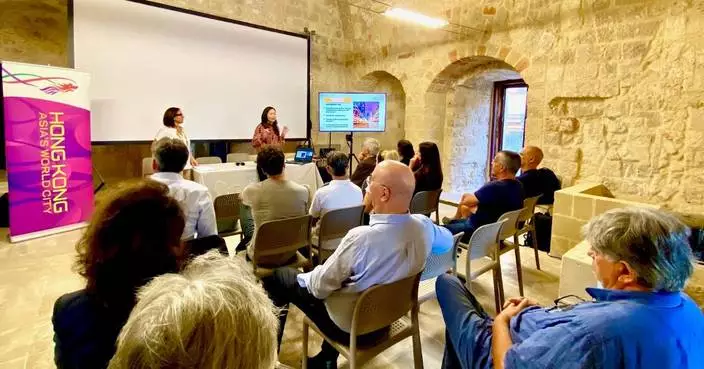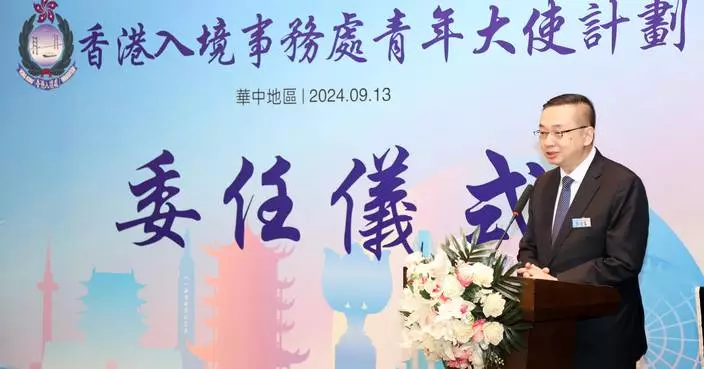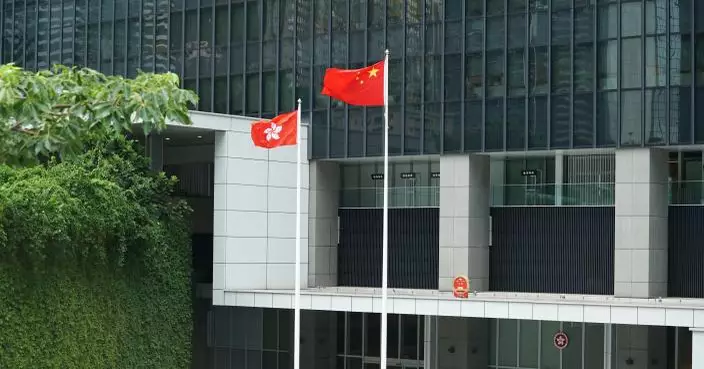Elderly Health Care Voucher Greater Bay Area Pilot Scheme to extend to Nansha District in Guangzhou and Dongguan from September 6
The Government today (August 28) announced that Nansha Division of the First Affiliated Hospital, Sun Yat-sen University in Nansha district in Guangzhou (FAH-NS) and Dongguan Tungwah Hospital in Dongguan (Tungwah Hospital) will implement the Elderly Health Care Voucher Greater Bay Area Pilot Scheme (Pilot Scheme) from September 6. The number of service points where the Hong Kong Elderly Health Care Voucher (EHCV) can be used in the Guangdong-Hong Kong-Macao Greater Bay Area (GBA) will be expanded to nine, marking the full implementation of the Pilot Scheme as announced in the Policy Address last year. On the same day, the new functions of "Cross-boundary Health Record" and "Personal Folder" in the eHealth mobile application (eHealth App) will also be extended to the First Affiliated Hospital, Sun Yat-sen University (FAH-SYSU) and Zhongshan Chen Xinghai Hospital of Integrated Traditional Chinese and Western Medicine (ZSCXH), which had already launched the EHCV services under the Pilot Scheme earlier on, to enhance the continuity of care for Hong Kong citizens through facilitating the secure use of cross-boundary electronic health records.
Elderly Health Care Voucher Greater Bay Area Pilot Scheme
------------------------------------------------------------------
"The Chief Executive's 2023 Policy Address" put forward the Pilot Scheme initiative to extend the coverage of the EHCVs to suitable medical institutions in the GBA in 2024. Following the launch of relevant arrangements at the FAH-NS and Tungwah Hospital from September 6, together with the two service points operated by the University of Hong Kong-Shenzhen (HKU-SZ) Hospital at its hospital and the Huawei Li Zhi Yuan Community Health Service Center, eligible elderly persons can use the EHCVs at nine service points in the GBA, including the five GBA medical institutions which commenced the services under the Pilot Scheme in phases starting from late June, namely FAH-SYSU in Guangzhou, ZSCXH in Zhongshan, as well as Shenzhen New Frontier United Family Hospital, Shenzhen C.K.J Stomatological Hospital and Dental Bauhinia Specialty Service Center (Shenzhen)/Dental Bauhinia General Care Center (Shenzhen) in Shenzhen. The Pilot Scheme will offer more convenience and flexibility to eligible Hong Kong elderly persons to better use the EHCVs at the service points in the GBA.
EHCVs are applicable for outpatient healthcare services provided by 14 designated departments at the FAH-NS, including the Department of Internal Medicine, Department of Surgery, Department of Gynecology, Department of Ophthalmology, Department of Otorhinolaryngology (Ear, Nose, Throat), Department of Stomatology (yet to commence operation), Department of Dermatology, Department of Rehabilitation Medicine, Department of Traditional Chinese Medicine, Department of Neurology, Department of Cardiovascular Medicine, Department of Nutrition, Health Management Center and Department of Emergency Medicine. As regards Tungwah Hospital, EHCVs will be applicable to 14 designated outpatient departments, namely the Internal Medicine Department, Surgery Department, Orthopedics Department, Gynecology Department, Ophthalmology Department, Stomatology Department, Emergency Medicine Department, General Medicine Practice, Clinical Nutrition Department, Traditional Chinese Medicine Department, Physical Examination Department, Dermatology Department, Rehabilitation Department and Clinical Psychology Department. More details and the relevant treatment flow are set out in the Annex.
The arrangements for shared use of EHCVs between spouses and the EHCV Pilot Reward Scheme under the EHCV Scheme are equally applicable to the FAH-NS and Tungwah Hospital. Elderly persons receiving designated primary healthcare outpatient services for health checks, and preventive and follow-up/monitoring of long-term conditions provided by the designated departments at the two above-mentioned medical institutions, can accumulate EHCV spending and be allotted rewards.
The fees for the healthcare services provided by the two above-mentioned medical institutions are denominated in Renminbi. They will make EHCV claims for elderly persons, and the EHCV amount deducted in Hong Kong dollars will be calculated according to a monthly updated voucher conversion factor under the EHCV Scheme. The monthly voucher conversion factor under the EHCV Scheme will be displayed at the cashier offices of the medical institutions for reference by the elderly.
The spokesman issued a reminder that "Hong Kong elderly persons using EHCVs at any designated medical institution in the GBA should have registered with eHealth. After joining eHealth, elderly persons can use the mobile app to check their EHCV balance and usage record, as well as access at any time important information such as their medications, allergies and adverse drug reactions stored in the eHealth App. If elderly persons wish to use EHCVs at the GBA medical institutions but they have not yet registered with eHealth, the medical institutions will instantly register them for eHealth upon their consent so that they can use EHCVs right away.
"Elderly persons cannot use EHCVs together with national medical insurance to pay for the fees of the same healthcare service encounter. The scope of using EHCVs on the Mainland is the same as that in Hong Kong, which does not include inpatient services, prepaid healthcare services and day surgery procedures. EHCVs cannot be used solely for the purchase of goods, medication, medical equipment or products, nor can they be redeemed for cash," added the spokesman.
If elderly persons suspect that the participating medical institutions have violated the EHCV Scheme rules, they can call the EHCV Scheme hotline (2838 2311) to provide relevant information and details to the Health Care Voucher Division of the Department of Health (DH). All suspected cases of violating the EHCV Scheme rules or making false declarations will be strictly dealt with by the DH. Furthermore, each GBA medical institution has set up an enquiry and complaint hotline. Elderly persons can also offer their views to the relevant medical institution, or file complaints against the medical institutions under the Pilot Scheme to the health authority at the provincial or city level if necessary. Members of the public can visit the following thematic website (https://www.hcv.gov.hk/en/hcv_gba_pilot_scheme/index.html) for more information.
Launched in 2009, the EHCV Scheme currently subsidises eligible Hong Kong elderly persons aged 65 and above with an annual EHCV amount of $2,000 (with the accumulation limit set at $8,000) for them to choose private primary healthcare services that best suit their health needs. Members of the public may browse the EHCV Scheme website (www.hcv.gov.hk) or call the EHCV Scheme hotline (2838 2311) for information on the EHCV Scheme.
"Cross-boundary Health Record" and "Personal Folder" functions of the eHealth App
---------------------------------------------------------------------------------------------
The Government launched the new functions of the eHealth App, namely "Cross-boundary Health Record" and "Personal Folder", at the HKU-SZ Hospital on a trial basis in July this year to facilitate Hong Kong citizens to carry and use their electronic health records across the border when seeking medical consultation at the HKU-SZ Hospital. At the same time, it also facilitates citizens to store the medical records obtained after consultation in the eHealth personal account for reference by other healthcare professionals in future.
These two new functions will be extended to the FAH-SYSU and ZSCXH from September 6. Elderly persons who use EHCVs at the two hospitals can apply for their electronic health records deposited in eHealth over the past three years through the "Cross-boundary Health Record" function in advance. Upon verification of elderly person's authorisation, a "File QR Code" and "Password QR Code" will be sent to the elderly person via the eHealth App. Healthcare professionals can then access and browse the health records by scanning the two QR codes presented by the elderly persons at the time of consultation to help in formulating diagnoses and providing treatments. The "Personal Folder" function, which enables e-Health users to deposit medical-related records obtained during consultations received in medical institutions outside Hong Kong into their eHealth personal accounts, can store and allow browsing of medical-related records obtained in and outside Hong Kong.
The Health Bureau earlier specifically set up a support station at the FAH-SYSU and ZSCXH to assist Hong Kong citizens to have a better grasp of the relevant functions. The Government is planning to extend the relevant functions to other medical institutions under the Pilot Scheme. Elderly persons can visit eHealth thematic website for more information.

Source: AI-generated images










